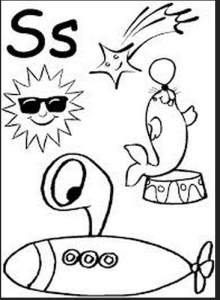A is for Apraxia. On Monday, we took at look at Apraxia of Speech in children. Specifically, we outlined the types of apraxia of speech and related symptoms. The most common type of apraxia of speech in children is developmental, which means it is a neurologically based speech disorder. While some children with Developmental Apraxia of Speech (DAS) had specific prenatal or birth injuries, for the most part, there is no specific cause of DAS. This month, we will plan to take a look into the subject of Apraxia of Speech in children in more depth.
5 Ways to Use Technology for Speech Therapy at Home
Apps Articulation Disorders At Home Ideas Language Development News Parents' Corner Speech Disorders
This week, Microsoft made a big announcement that it will soon be offering Office for the iPad! This is great news for those looking to create and edit documents, spreadsheets and presentations on the iPad or mobile device. This latest announcement further demonstrates the prevalence of technology in our lives presently and in the future. Can technology help dedicate time to working on speech therapy at home? Absolutely! If you have access to mobile device such as an iPad, there are many free apps and online resources that can help your child improve his or her communication skills with speech therapy at home.
S is for Spring, not Lisp! Speech Sheets for the ‘S’ Sound
Articulation Disorders At Home Ideas Language Development Lisp Parents' Corner Pronunciation & Lisps Speech Disorders Speech Therapy Techniques
Spring has sprung, and what better time to practice those “s” sounds! Did you know that the “s” sound is one of the most mispronounced sounds in the English language? According to Pronunciation Workshop, approximately half of all “s” sounds in English are pronounced as a letter “z” or “th.” For a child with a speech impediment, the “s” sound proves particularly challenging. Common in articulation disorders, a child drops the “s” sound all together such as “and,” instead of “sand”. Or a child may mispronounce the “s” sound at the beginning or end of a word, giving him a lisp.
Help! My Child Is Being Teased For Her Speech Impediment
Articulation Disorders News Parents' Corner School Speech Disorders Speech Therapist Speech Therapy Techniques“People tease me because of the way I talk.” “The other kids at school don’t like my words.” Do these statements sound familiar in your home? The unfortunate fact is that children who have a speech impediment are often subjected to teasing from their peers. According to a study by Professor Gordon W. Blood, Ph.D., CCC-SLP:
children who stutter are 61% more likely to be targeted by a bully.
Teasing and bullying at school can be a frightening experience.
Continue reading
What to Expect: First Speech Therapy Lesson
Articulation Disorders Language Development News Parents' Corner Pronunciation & Lisps School Speech delay Speech Disorders Speech Impediment Speech Therapist Speech Therapy TechniquesYour child has been diagnosed with a speech impediment or speech disorder. Whether she suffers from the common types of speech impediments such as stuttering, apraxia of speech, a speech sound disorder, cluttering or a lisp, early speech therapy intervention is crucial to successful treatment. But what happens in your first speech therapy visit? What can you expect? Here is a brief run-down of your first visit with a speech-language pathologist (SLP). Planning ahead and being prepared will help you make the most out of your first visit with a speech pathologist and set you on a successful course of speech therapy treatment.
Will My Child Outgrow Her Speech Impediment?
Articulation Disorders Language Development News Parents' Corner Pronunciation & Lisps School Speech delay Speech Disorders Speech Therapist Speech Therapy TechniquesYour child hasn’t reached the speech and language milestones as quickly as her buddies. And, she says “thoup” instead of “soup”. Does this mean she has a speech impediment? Does she need speech therapy? Will she outgrow it on her own? Parents whose children are at the beginning stages of speech and language development ask these questions and more as their children’s speech patterns emerge. There are no real clinical “tests” to determine whether or not your child is a late talker, has a real speech impediment, or if it will indeed resolve itself on its own. Many children with early speech impairments do eventually outgrow them by the time they are ready for kindergarten. It is important to discuss your concerns with your child’s healthcare provider for any developmental challenges as there are also many other causes and types of speech disorders.
Continue reading
Four Questions To Help Identify a Speech Impediment
Articulation Disorders Language Development Parents' Corner Speech Disorders Speech Impediment Speech Therapy Techniques
Are you concerned that there may be something wrong with your toddler’s communication and language skills? Is it possible that your child may have a speech impediment or disorder? Of course you don’t expect him to speak clearly in the first few months or even years of life, but are you seeing signs that perhaps something is just not quite right? Has your child’s daycare or preschool teacher mentioned that he isn’t reaching typical communication milestones? How important are these milestones? Maybe you’ve heard that it is “just a phase” or that your child will “catch up” with the other kids her age. While every child learns at his or her own pace, it’s important to ask for help if you feel like her language development skills may not be normal. Communication Milestones are actually crucial stages during the first three years of life when the brain is developing and maturing, and is the most intensive period for acquiring speech and language skills. If the critical periods or milestones are are not met in a timely manner, it will be more difficult for your child to learn to properly communicate in the future.
4 Easy Tricks for Speech Therapy at Home
Articulation Disorders At Home Ideas Language Development News Parents' Corner Speech Disorders Speech Therapy Techniques
 This week we’ve been discussing ways to tell if your child has a speech disorder, and evaluating if the recommended Communication Milestones are a good indicator of a possible speech impediment. Whether or not your child has been diagnosed with any speech challenges, there are many tips and tricks for speech therapy at home that you can do to help build your child’s communication skills, especially as a toddler. Language building is essential during the first years of a child’s life, as this is when most of the pathways for developing speech, language and cognitive skills are formed.
This week we’ve been discussing ways to tell if your child has a speech disorder, and evaluating if the recommended Communication Milestones are a good indicator of a possible speech impediment. Whether or not your child has been diagnosed with any speech challenges, there are many tips and tricks for speech therapy at home that you can do to help build your child’s communication skills, especially as a toddler. Language building is essential during the first years of a child’s life, as this is when most of the pathways for developing speech, language and cognitive skills are formed.
Understanding Speech Impediments in Children
Articulation Disorders Language Development News Parents' Corner Pronunciation & Lisps Speech Disorders Speech Therapist Speech Therapy TechniquesHow do you know if your child has a speech impediment? Speech impediments in children are more common than you might think. They are a type of communication disorder where “normal” speech is disrupted. The disruption can include a lisp, stuttering, stammering, mis-articulation of certain sounds and more. Another commonly used phrase for speech impediments in children is speech disorder. Often, the causes of a speech impediment are unknown. However, sometimes there are physical impairments such as cleft palate or neurological disorders such as traumatic brain injury that may be the cause of the speech impairment. We have listed below five of the most common types of speech impediments in children and a general description of each. Of course, if you suspect your child may have a speech impairment of any kind, we encourage you to visit your pediatrician or hire a Speech Therapist for more information.
Three Valentine’s Day Activities For Your Kids
Articulation Disorders Arts and Crafts At Home Ideas Language Development Parents' Corner School Speech Disorders Speech Therapy TechniquesIn the spirit of Valentine’s Day, we want to share with you three fun ideas to celebrate Valentine’s Day with your students and kids! Of course, you can pull out some arts and crafts, stickers and colored paper to make homemade cards, but we’ve gone a bit further with some crafty and creative ways to get your involved with your kids, and provide an opportunity for language building and speech therapy techniques. We gathered these activities from some of our favorite Speech Therapy websites, so, grab your scissors, paper and tape and get ready for some Valentine’s Day fun!









